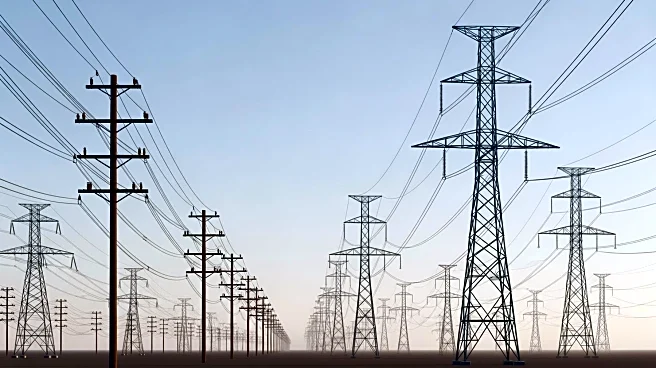What's Happening?
The Federal Energy Regulatory Commission (FERC) has directed the Midcontinent Independent System Operator (MISO) to specify the integration of merchant high-voltage, direct-current transmission projects
into its transmission planning models. This decision follows a complaint by Invenergy Transmission regarding MISO's handling of the Grain Belt Express project, a 5-GW transmission line planned to run from Kansas to Indiana. Invenergy argued that MISO's omission of merchant projects from its plans could lead to inefficient outcomes and increased customer rates. FERC's ruling aims to ensure that merchant projects, which do not rely on direct ratepayer support, are properly accounted for, potentially offering cost savings and reliability benefits.
Why It's Important?
This decision by FERC is significant as it addresses the integration of merchant transmission projects, which are crucial for meeting the growing energy demands, particularly from sectors like artificial intelligence. By including these projects in transmission planning, FERC aims to enhance grid reliability and reduce costs for ratepayers. The ruling could influence future infrastructure investments and planning processes, ensuring that stakeholders have the best information to assess grid needs. This move is expected to bring more confidence in MISO's planning and cost-benefit assumptions, which is vital given the substantial investments involved.
What's Next?
MISO has been given 90 days to outline how merchant HVDC transmission projects will be incorporated into its planning processes. This includes specifying their inclusion in MISO Transmission Expansion Plan base cases and potentially in sensitivity analyses. The decision could lead to adjustments in MISO's long-range transmission plans, potentially affecting ongoing and future projects. Stakeholders, including state utility regulators and transmission customers, are likely to closely monitor MISO's response to ensure consumer value and efficient infrastructure development.
Beyond the Headlines
The decision highlights the broader implications of integrating merchant projects into transmission planning, which could lead to a shift in how energy infrastructure is developed and financed. It underscores the importance of transparency and stakeholder engagement in planning processes, which can drive more informed and sustainable energy solutions. Additionally, the ruling may prompt other grid operators to reevaluate their approaches to merchant project integration, potentially influencing national energy policy and regulatory frameworks.











